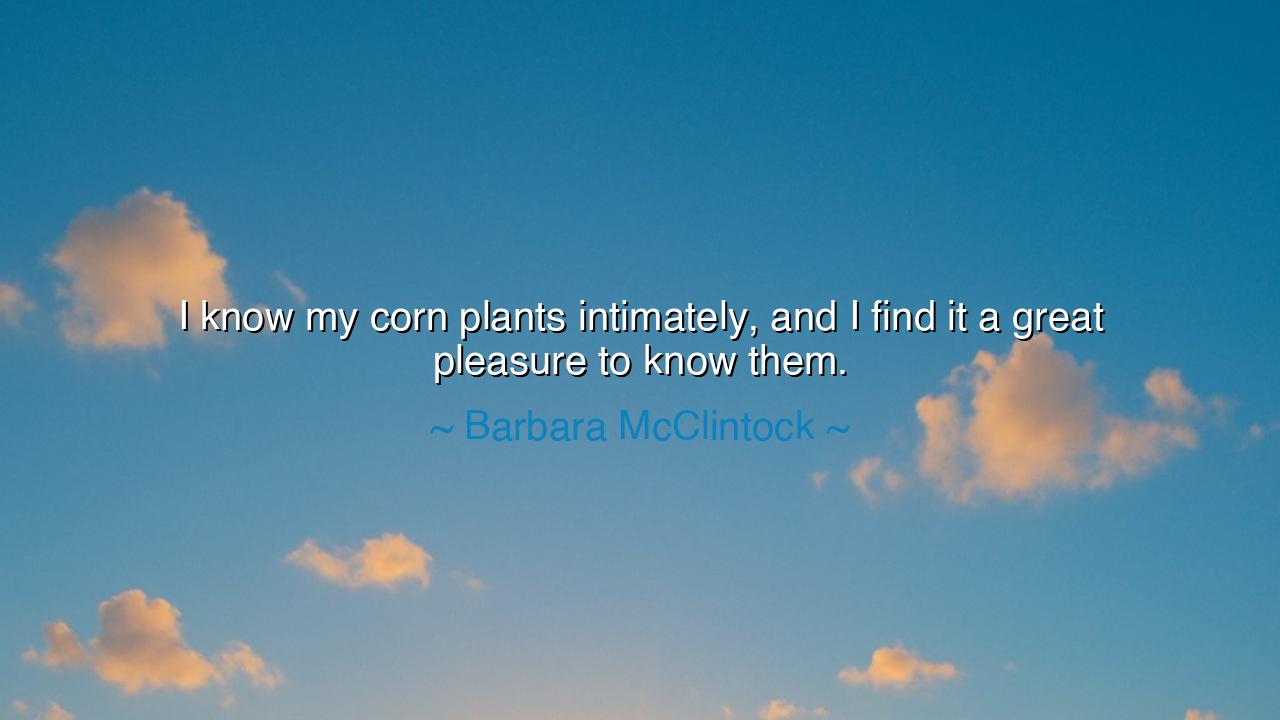
I know my corn plants intimately, and I find it a great pleasure






“I know my corn plants intimately, and I find it a great pleasure to know them.” — Barbara McClintock
In this gentle yet profound declaration, Barbara McClintock, the Nobel Prize-winning scientist, reveals the sacred union between knowledge and intimacy, between science and love. Her words, though spoken of corn plants, echo the timeless wisdom of all true seekers — that to truly understand something, one must not merely study it, but know it with the heart. For McClintock, her field of maize was not a laboratory of numbers and data, but a living universe, a mirror of the divine intricacy that threads through all life. To “know intimately” is to move beyond observation into communion — to touch, in the smallest seed, the infinite mystery of creation.
McClintock’s work in genetics transformed our understanding of biology. In the 1940s and 1950s, she discovered the existence of “jumping genes,” elements that move and reshape the genome — a revelation that would not be fully recognized until decades later. Yet the secret of her success lay not in machines or theories, but in her deep empathy with the living things she studied. She spoke to her plants, listened to their rhythms, and sensed their struggles. Her relationship with them was one of reverence, patience, and listening — qualities that the modern world, in its rush for mastery, too often forgets. McClintock did not dominate nature; she befriended it, and nature, in turn, revealed her secrets.
The ancients would have understood her well. The philosophers of old did not separate knowledge from spirit, nor observation from awe. Aristotle spoke of “wonder” as the beginning of all wisdom. Taoist sages taught that understanding flows from harmony with the natural order, not from conquering it. McClintock’s “intimacy” with her corn plants is thus not sentimentality, but the return of an ancient truth — that true knowledge is born of love, not detachment. Just as the shepherd knows the temperament of every sheep, or the gardener feels the pulse of the soil, so too did she come to know her plants not as specimens, but as companions in discovery.
There is something almost mystical in her words. “I find it a great pleasure to know them,” she says — and in that pleasure lies the secret of mastery. The greatest work, in any field, comes not from ambition but from joy. McClintock’s joy was her compass, guiding her through long hours of solitude, through skepticism and rejection, until at last her vision was vindicated. The world called her work genius, but what she called it was love. Her corn plants, humble and unassuming, became the doorway through which she glimpsed the living intelligence of the universe.
Such intimacy with one’s craft or calling is the mark of all who reach greatness. Michelangelo said he could see the angel imprisoned in the marble before he touched it with his chisel. Van Gogh painted not just fields and flowers, but the soul of the earth itself, glowing with divine fire. And in the same way, Barbara McClintock saw in the corn’s chromosomes the very breath of life — patterns of struggle and cooperation, mirroring our own. These are the hearts of the true artisans, the true scientists, the true seekers — those who love what they study so deeply that it reveals itself willingly, as a friend reveals her secrets to one who truly listens.
The lesson here, O seeker of understanding, is clear: to know something deeply, you must love it deeply. Whether you study stars or numbers, music or machines, let your knowledge be tender, not proud. Learn to observe with patience, to listen without haste, to dwell with what you seek until it begins to speak. For all creation is alive, and only the humble heart can hear its song. To treat the world as lifeless is to learn nothing; but to approach it with wonder is to uncover its infinite wisdom.
Therefore, walk as Barbara McClintock walked — not as a conqueror of knowledge, but as a companion of truth. Whatever your field of labor, make it a friendship. Know your craft intimately — its beauty, its rhythm, its mystery — and take joy in that knowing. For the one who learns through love becomes both student and teacher of the universe. And when, in your own way, you can say as she did, “I find it a great pleasure to know,” you will have found not only wisdom, but peace — the peace that comes from living in harmony with the living world.






AAdministratorAdministrator
Welcome, honored guests. Please leave a comment, we will respond soon